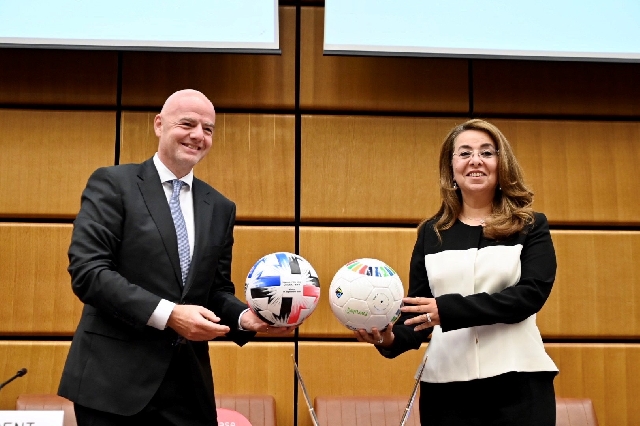UNODC, FIFA partner to kick out corruption; foster youth dev’t through football

The UN’s leading anti-corruption agency, the United Nations Office on Drugs and Crime (UNODC), and the world football’s governing body, the Fédération Internationale de Football Association (FIFA), today signed a Memorandum of Understanding (MoU) to step up their joint cooperation to address threats posed by crime to sport.
The MoU, which was signed at UNODC’s Vienna-based headquarters by UNODC Executive Director Ghada Waly and FIFA President Gianni Infantino during the ‘Tackling Corruption and Crime in and through Sport’ event, also pledges to consider ways in which football can be used as a vehicle to strengthen youth resilience to crime and substance use through the provision of life skills training.
“Sports support the development of children and youth, and we need sports more than ever in the COVID-19 recovery to make people healthier and happier, and bring jobs back. But in order to harness the power of sports we need to protect sports integrity,” said UNODC Executive Director Ghada Waly.
“I believe that FIFA, the international governing body of football, the world’s game, and the United Nations, the world’s organization, make formidable allies, and I am very pleased that UNODC and FIFA have joined forces by signing this Memorandum of Understanding to safeguard football and sporting events from corruption, promote youth crime prevention, and keep children and young athletes safe from violence and exploitation.”
“Since 2016, the new FIFA has taken significant strides in relation to good governance and in the area of football integrity, including the fight against match manipulation and safeguarding of children in football,” said FIFA President Gianni Infantino.
“Today’s signature of the Memorandum of Understanding with UNODC is a milestone for the organisation and underlines the absolute commitment of the new FIFA and myself to a zero tolerance policy on corruption in football: never again! It also shows our commitment to put football at the service of society and to use it as a tool to support the achievement of public policy objectives and the UN Sustainable Development Goals.
“We are proud to have a partner like UNODC as we strive to strengthen further the integrity of football and to use the unique power of the beautiful game to promote values and life skills to foster youth development and crime prevention.”
The signing of the MoU comes amid intensified efforts to mitigate the negative impact of COVID-19 on sport and a commitment to help football to recover from the crisis both in the short term and while the world adjusts to the ‘new normal’. Against this backdrop, discussions between the two organizations focused on several key areas of collaboration, including child safeguarding and the protection of vulnerable youth in football, anti-match manipulation and anti-corruption, the legacy of major football competitions, life skills development, anti-discrimination, and social inclusion through football in the context of youth crime prevention.
The agreement also seeks to leverage the two organizations’ respective strengths to ensure a positive impact on the global fight against corruption and crime in and through sport, and to enhance the positive influence of football on the world’s youth, by building their resilience to violence and crime and promoting fair play, team work, non-discrimination, tolerance and respect.
The UNODC also agreed to participate in a consultation process launched by FIFA that includes sports organisations, intergovernmental authorities, governments and specialist agencies with the objective of establishing an independent, multi-sports, multi-agency international entity to investigate abuse cases in sports. The remit of such an organisation would include:
the establishment of trusted reporting lines; the formation of a global pool of experts, that can be promptly mobilised to provide specialist case management and care support to victims, witnesses and whistleblowers, locally; the standardisation of sanctions and disciplinary measures; and the establishment of screening processes to ensure that perpetrators cannot move from one region to another, between different sports, nor escape justice. Note to Editors
Please note that a short Video News Release (VNR), including b-roll footage of today’s signing, is available for broadcasters and online publication. To download the VNR, please click HERE.
In 2019, FIFA launched the FIFA Guardians™ programme, which provides practical guidance to support the 211 FIFA member associations in reviewing their existing safeguarding measures, to help prevent any risk of harm to children in football, and to respond appropriately if concerns arise by reporting cases of abuse to the relevant national authorities and child protection agencies.
To read more about the FIFA Guardians™ programme, please click HERE.
Background information:
The MoU foresees cooperation between UNODC and FIFA in a number of areas, including technical assistance and capacity building, policy coordination and awareness raising, and development of studies, training material and guidelines. Thanks to the new landmark agreement, UNODC and FIFA will focus their efforts on five broad areas of work:
Supporting capacity building and training programmes in the field of combatting and preventing the manipulation of sporting events; Supporting the joint work related to good governance, the promotion of integrity and safeguarding of sporting events and organisations from corruption and abuse of power (e.g. effective control systems); Supporting the use of sport as a tool for youth development, crime prevention and substance use prevention, including through the provision of life skills training; Exchanging information and expertise with regard to preventing corruption in sport, and in particular competition manipulation (e.g. participation in conferences, regular meetings, contribution to studies); and Developing technical tools and publications.








